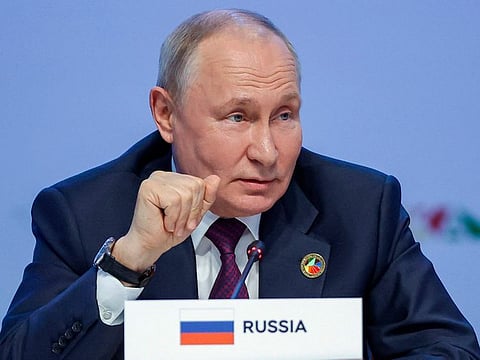Putin says Russia does not reject talks with Ukraine
‘African initiative could be basis for peace but Ukraine attacks made it hard to realise’

Moscow: Russian President Vladimir Putin said on Saturday that an African initiative could be a basis for peace in Ukraine but that Ukrainian attacks made it hard to realise.
He was speaking at a press conference after meeting African leaders in St Petersburg on Friday and hearing their calls for Moscow to move ahead with their plan.
“There are provisions of this peace initiative that are being implemented,” he said. “But there are things that are difficult or impossible to implement.”
Reuters reported in June that African mediation in the conflict could begin with confidence-building measures followed by a cessation of hostilities agreement accompanied by negotiations between Russia and the West.
Putin said that one of the points in the initiative was a ceasefire.
“But the Ukrainian army is on the offensive, they are attacking, they are implementing a large-scale strategic offensive operation... We cannot cease fire when we are under attack.”
On the question of starting peace talks, he said, “We did not reject them... In order for this process to begin, there needs to be agreement on both sides.” Ukrainian President Volodymyr Zelenskiy has rejected the idea of a ceasefire now that would leave Russia in control of nearly a fifth of his country and give its forces time to regroup after 17 grinding months of war.
Meanwhile, African leaders left after two days of meetings with Putin with little to show for their requests to resume a deal that kept grain flowing from Ukraine and to find a path to end the war there.
Putin said Russia’s termination of the grain deal earlier this month caused a rise in grain prices that benefits Russian companies. He added that Moscow would share some of those revenues with the “poorest nations.”
That commitment, with no details, follows Putin’s promise to start shipping 25,000 to 50,000 tonnes of grain for free to each of six African nations in the next three to four months — an amount dwarfed by the 725,000 tonnes shipped by the UN World Food Program to several hungry countries, African and otherwise, under the grain deal. Russia plans to send the free grain to Burkina Faso, Zimbabwe, Mali, Somalia, Eritrea and Central African Republic.
“We would like the Black Sea initiative to be implemented and that the Black Sea should be open,” South African President Cyril Ramaphosa said. “We are not here to plead for donations for the African continent.”



